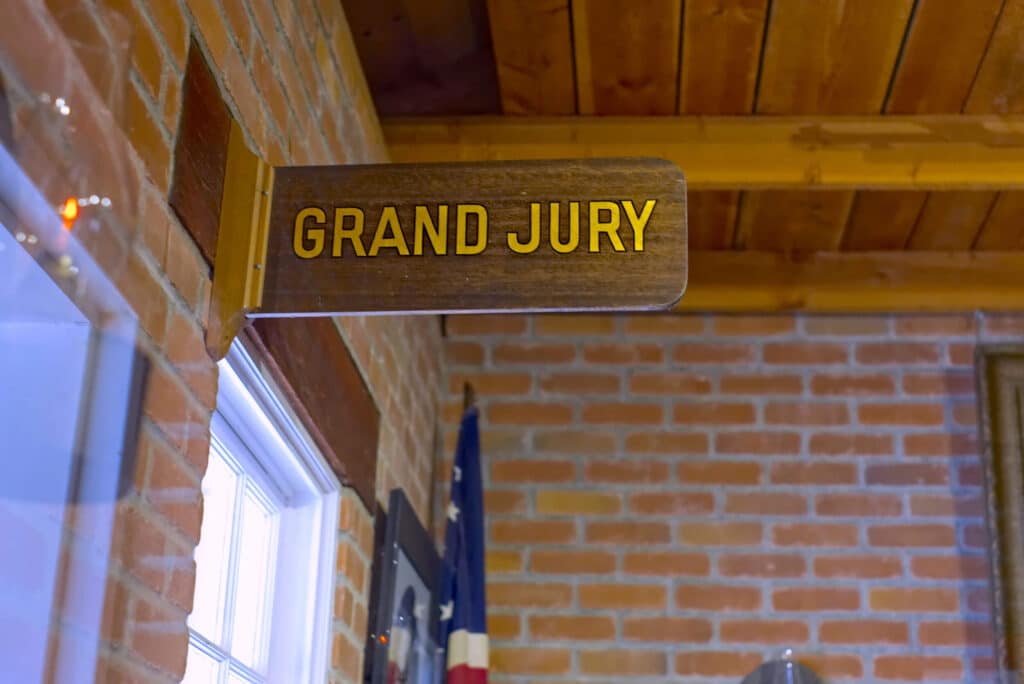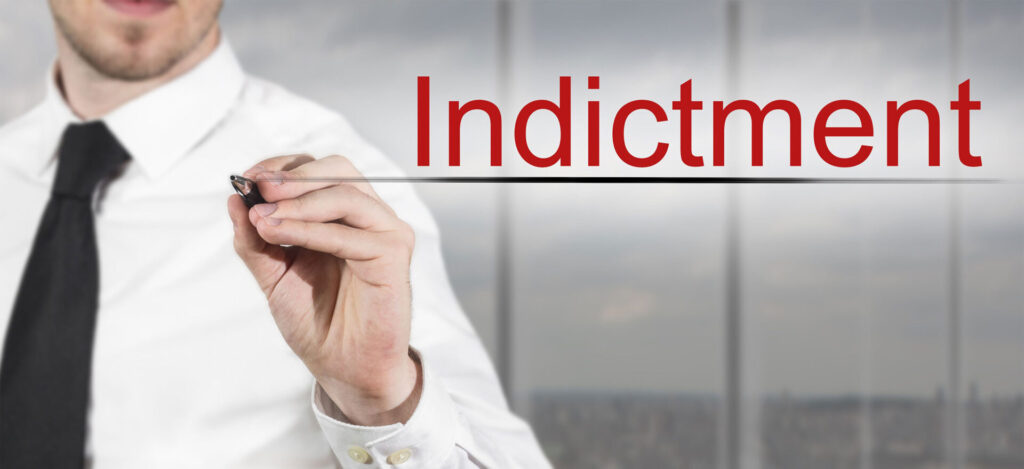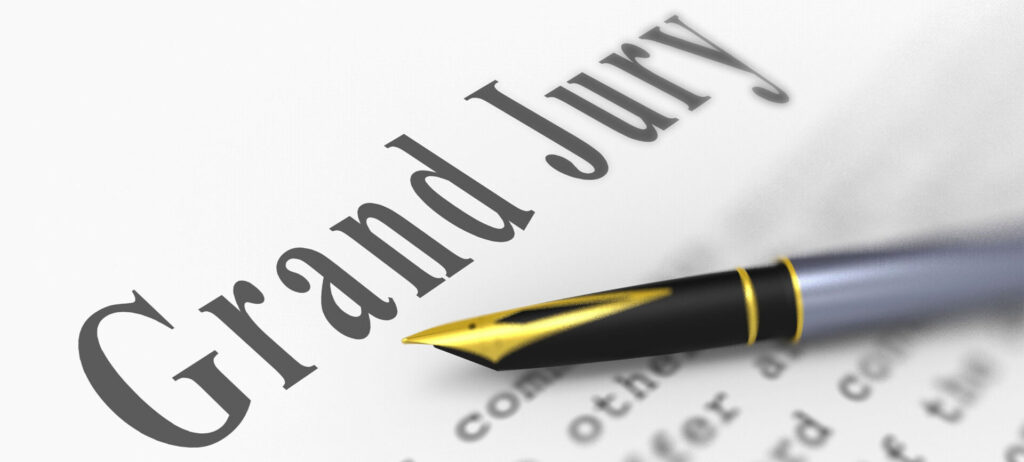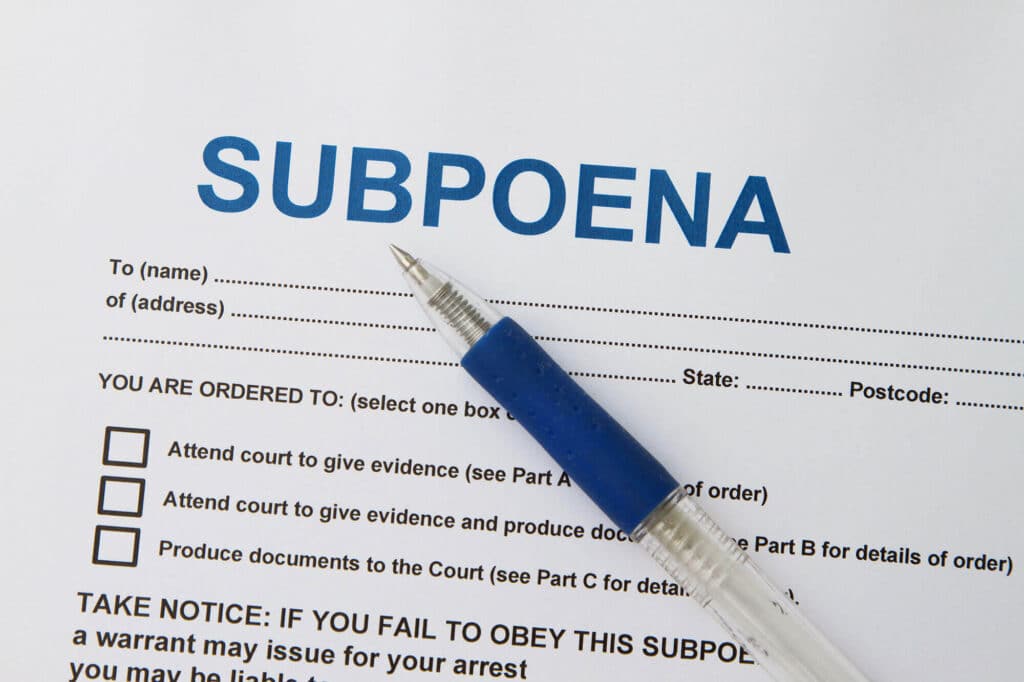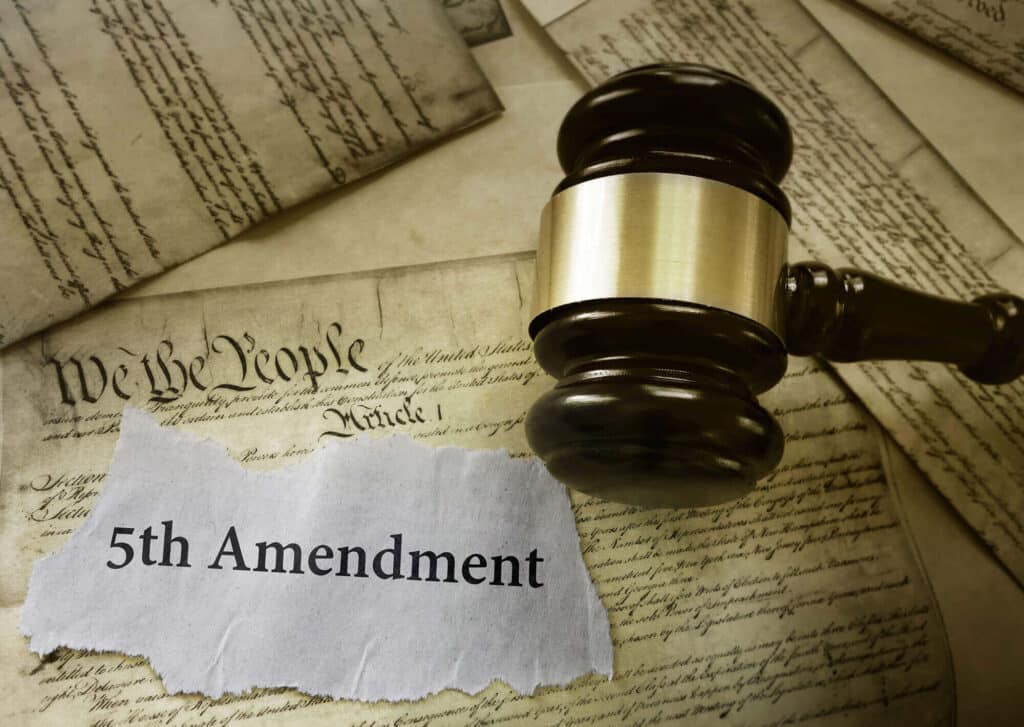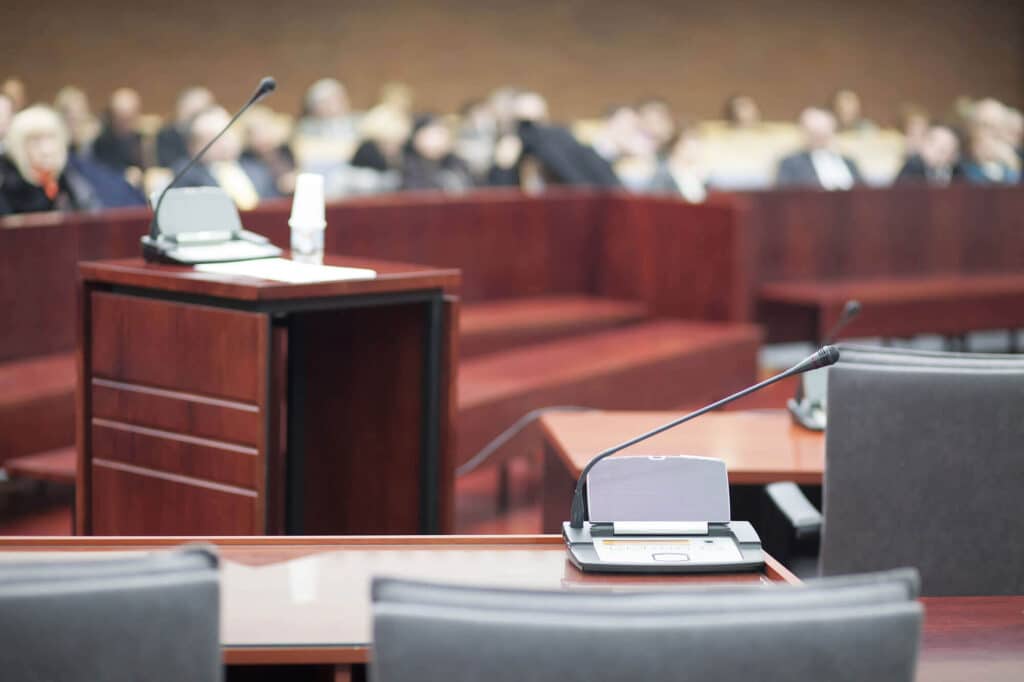
Receiving a grand jury subpoena can be a stressful experience for most individuals. A grand jury subpoena may request the production of documents or require your appearance for testimony, or both. Responding to any grand jury subpoena without the proper legal advice may place you in serious legal trouble. Contact me for an aggressive PA grand jury investigation defense.
The Importance of Having a Lawyer in Grand Jury Proceedings
It is not unusual for prosecutors to file perjury charges against individuals they believe did not provide truthful testimony before the grand jury.
In other cases, an individual may choose to testify before the grand jury without the advice of a lawyer and unknowingly provide testimony that leads to the filing of state or federal charges against them.
Failing to appropriately respond to a subpoena for the production of documents can also lead to severe penalties, including being found in contempt of court.
Consequently, if you are under a grand jury investigation and have received a grand jury subpoena, you must consult with a knowledgeable criminal defense attorney before you respond to the subpoena.
Bucks County Grand Jury Defense Lawyer
I have over a decade of experience providing skilled and aggressive representation to individuals facing state and federal grand jury investigations in Bucks County, Montgomery County, and the surrounding Pennsylvania Counties.
Contact me at (215) 752-5282 for a free initial consultation, or fill out the confidential contact form for an immediate response. Appointments are available after business hours and on weekends.
Understanding the Grand Jury Process
State and federal grand juries consist of citizens impaneled to hear evidence and determine whether probable cause exists to recommend criminal charges against one or more individuals. Grand jury proceedings are secret.
With limited exceptions, the prosecutor and other participants cannot disclose information related to grand jury matters. However, grand jury witnesses generally have permission to disclose their testimony unless the supervising judge specifically prohibits the disclosure.
What is the Difference Between Jury and Grand Jury?
In a civil case, a jury determines negligence, breach of contract, personal injury, or other civil causes of action. In contrast, a jury in a criminal trial decides whether a citizen is guilty or not guilty of committing a crime.
Generally, a grand jury only decides whether a person is charged with a crime or crimes.
The Danger of Appearing Before the Grand Jury without an Attorney
Unfortunately, the grand jury process is a one-sided proceeding that lacks most of the constitutional protections a citizen receives during a trial. Both federal and state grand juries can issue subpoenas to individuals who may possess evidence relevant to the investigation.
Grand juries can also compel testimony from individuals the prosecutor believes are related to the case, including witnesses, subjects, and targets.
Unlike a civil or criminal trial, a judge does not preside over the grand jury hearings, and the rules of evidence do not apply. Therefore, hiring an experienced grand jury lawyer as soon as you become the subject of a state, local, or federal grand jury investigation is critical.
Grand Jury Rules Favor the Prosecution
During the grand jury hearing, the target or subject of the investigation is not permitted to be present unless they are testifying. Also, grand jury witnesses are not subject to cross-examination, or other means of testing their credibility, honesty or truthfulness.
In a grand jury proceeding, state and federal prosecutors usually present only evidence that supports the filing of criminal charges or an indictment against the accused.
Grand jury rules do not require the prosecutor to present evidence establishing the innocence of those under grand jury investigation. If you receive a grand jury subpoena, I can protect your interests and guide you through the process if you are under a federal or state investigation.
What is a Federal Grand Jury?
Federal grand juries operate differently from Pennsylvania state grand juries. As a result, federal grand juries comprise between 16 and 23 members who receive evidence from the United States Attorney regarding felony-graded federal crimes occurring within the federal district in which the jury is impaneled.
Unlike state grand juries, the defense attorneys representing individuals testifying before a grand jury are not permitted to be present in the grand jury room. After receiving the prosecutor’s evidence and arguments, federal grand jurors vote on whether to issue a charging document known as an indictment.
A grand jury forwards an indictment if at least 12 of its 23 members vote that probable cause exists to believe one or more individuals violated federal criminal laws. I can protect your rights if you receive a subpoena as part of a federal grand jury investigation.
Pennsylvania Investigative and Indicting Grand Juries
In Pennsylvania, the law allows for both investigative and indicting grand juries. Pennsylvania investigative grand juries are generally conducted before criminal charges are filed. However, indicting grand juries can be impaneled after criminal charges have been filed.
Also, the indicting grand jury has the responsibility to decide whether or not a criminal defendant’s case is bound over for trial. Finally, Pennsylvania indicting grand juries are limited to cases where witness intimidation has occurred, is occurring, or is likely to occur.
Pennsylvania Grand Jury Procedure
A Pennsylvania investigating grand jury will issue a “presentment” if a majority of the grand jurors believe they received sufficient evidence to conclude that the accused violated state laws.
A grand jury presentment is a document that outlines the factual basis upon which certain charges are recommended to be filed against specific individuals.
The grand jury’s supervising judge can either accept or reject the grand jury’s presentment. In most cases, the supervising judge of the grand jury will follow the grand jury’s decision.
As a result. the police or Pennsylvania State Attorney General will file formal criminal charges against the accused if the supervising judge approves the grand jury’s presentment.
What is a Grand Jury Subpoena?
A grand jury subpoena is a document that typically lists your name and a date, time, and address for your appearance to provide testimony before a grand jury. The grand jury can be empaneled in state or federal court.
State and federal grand juries are seated on specified days of each month until termination. Also, members of law enforcement serve grand jury subpoenas to witnesses.
Grand Jury Procedure
Federal and state grand juries have significant power and resources to use against citizens. Both grand juries can issue subpoenas that require you to testify, produce documentary evidence, or both.
Therefore, consulting with a criminal defense attorney with experience in grand jury procedure is vital before responding to a grand jury subpoena for testimony or documents.
Individuals who fail to appropriately respond to a grand jury subpoena can be found in contempt of court. Penalties for contempt of court may include the court-ordered imposition of significant fines and jail time.
Challenging the Grand Jury Subpoena
An experienced criminal defense lawyer can determine whether a grand jury subpoena for documents is overly broad or whether work-product, marital, or other legal privilege covers the documents requested under the subpoena.
In such cases, an individual must not turn over documents in response to a grand jury subpoena. In addition, I can determine whether legal privilege protects your documents are protected from grand jury subpoena.
The Importance of Understanding your Status before the Grand Jury
Receiving a call to appear before a grand jury can be very intimidating and carries many risks. Unlike federal prosecutors, Pennsylvania state prosecutors are not required to inform the subject of a grand jury subpoena of their status as either a witness, subject, or target.
Depending on your situation, it may be in your best interest to avoid testifying and potentially placing yourself in legal jeopardy. Finally, I can determine your status and the most effective legal strategy to protect your constitutional rights if you are called to appear before a grand jury.
Types of Federal Grand Jury Witnesses
Target
An individual is considered a federal grand jury investigation target if the prosecutor has accumulated a significant amount of evidence connecting that individual to a crime. At the end of grand jury proceedings, targets often face indictment on criminal charges.
Subject
A subject in a federal grand jury investigation has not been significantly implicated in criminal activity but may eventually face indictment on criminal charges.
Whether a subject becomes a target depends on the path of the investigation and on the evidence uncovered by law enforcement agents. In some cases, a subject in a federal grand jury investigation can transition to the status of a grand jury witness.
Witness
A federal grand jury witness is usually not a witness to a crime as the term is commonly understood. Grand jury witnesses are individuals who are called before the grand jury to testify or to provide records or documents.
A grand jury witness will generally not face criminal charges unless the prosecutor believes he or she did not testify truthfully or otherwise failed to comply with a grand jury subpoena.
5th Amendment Privilege before the Grand Jury
Responding to a grand jury subpoena without understanding your rights can often place you at significant legal risk. Both the 5th Amendment of the United States Constitution and Article I, Section 9 of the Pennsylvania Constitution prevent the government from forcing citizens to provide evidence against themselves in a criminal prosecution.
The 5th Amendment Privilege Applies before both State and Federal Grand Juries
The privilege against self-incrimination applies to testimonial evidence and provides protection to citizens called to testify before both state and federal grand juries. An individual does not have to be involved in a criminal activity to be able to assert the privilege against self-incrimination in a grand jury proceeding.
In some cases, I can negotiate with the prosecutor to receive an immunity agreement in exchange for your testimony. Immunity agreements will generally protect a grand jury witness from prosecution as long as they testify truthfully.
I can help you choose the most effective legal strategy to protect your rights and limit your chances of facing criminal prosecution.
Types of Grand Jury Testimony Covered by the 5th Amendment Privilege
Our 5th Amendment privilege against self-incrimination is broad. For example, in a grand jury courtroom, the 5th Amendment prevents grand jury prosecutors from requiring citizens to answer a question that may cause them to incriminate themselves.
Therefore, the 5th Amendment allows individuals to refuse to answer questions that may incriminate them directly or indirectly in criminal activity.
The privilege against self-incrimination also protects individuals from being compelled to provide testimony when there is a possibility that the compelled testimony may be combined with other evidence to establish evidence of a crime.
For example, an individual’s grand jury testimony may become incriminating if it creates a link in a chain of evidence demonstrating that the individual participated in a crime.
Determining whether you should invoke your privilege against self-incrimination before a state or federal grand jury often requires a complex analysis of the facts of the case and the applicable state and federal laws.
I can review the evidence and circumstances of your case to determine if should invoke your 5th Amendment privilege in a grand jury proceeding.
The Dangers of Testifying before a Grand Jury
It is risky for an individual to testify before a grand jury without consulting with an experienced criminal defense lawyer. Moreover, an unprepared and uncounseled grand jury witness may inadvertently waive their 5th Amendment rights after answering only a few questions.
Once the privilege against self-incrimination is waived, you may be prevented from asserting it in response to questions by the prosecutor. In addition, I can fully prepare you for your grand jury appearance by identifying the questions that the prosecutor may ask and the areas of questioning covered by your 5th Amendment privilege.
Negotiating with the prosecutor for a grant of immunity in exchange for your testimony may be the best strategy in cases in where an agreement for reduced charges or a non-prosecution agreement exists.
Finally, I will review the facts and circumstances of your case to develop the strongest defense to protect your rights.
Grand Jury Defense Attorney
Suppose you have received a grand jury subpoena in Bucks County, Montgomery County, Philadelphia County, Delaware County, Chester County, or the nearby Pennsylvania area. In that case, you must act quickly to protect yourself from the local police or the federal authorities charging you with a crime.
Phone lines are open 24 hours a day at (215) 752-5282. Call today for a free initial consultation, or fill out the confidential contact form for an immediate response.
